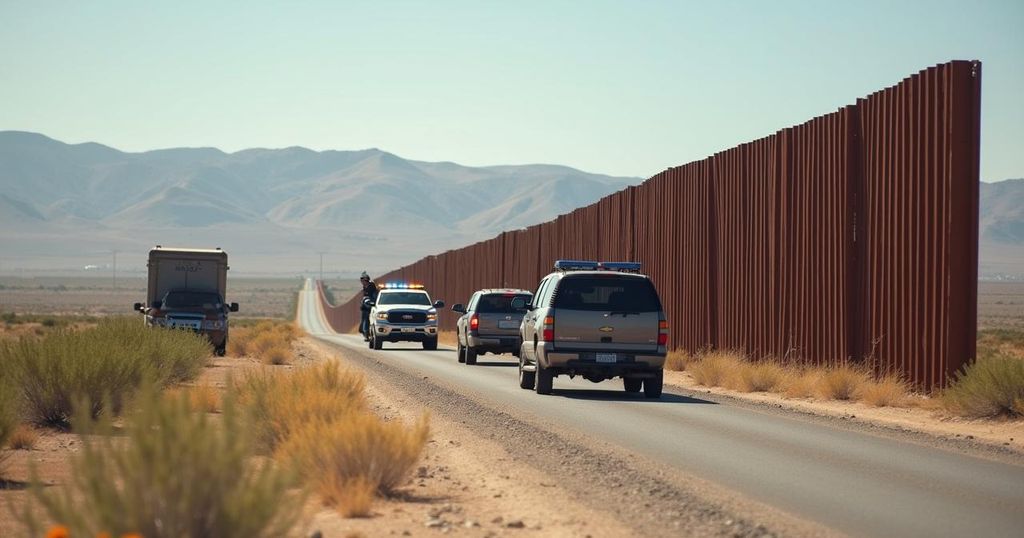As US Election Approaches, Mexico Intensifies Border Enforcement Policies to Curb Migration

The article discusses the significant decrease in migrants reaching the U.S. border as the presidential election approaches, credited to an implicit agreement between the U.S. and Mexico aimed at controlling migration. This shift has led to stringent enforcement of immigration policies by Mexico, reflecting both economic interests and political stakes in the context of the upcoming elections. The story highlights real-life experiences of migrants facing harsher conditions, illustrating the challenges of contemporary migration.
As the United States approaches its presidential elections, migration from Central America has substantially decreased, with fewer individuals reaching the U.S. border compared to previous years. Analysts attribute this decline largely to a tacit agreement between the United States and Mexico, initiated by the Biden-Harris administration late in the previous year. This pact is reportedly motivated by Mexico’s economic interests, aiming to maintain a sense of order at the border and ensure the uninterrupted flow of exports northward, as well as the political implications of the U.S. election cycle, which poses significant stakes for Mexico. Illegal border crossings have become a focal issue in the electoral campaigns, specifically for former President Donald Trump, while political figures such as Vice President Kamala Harris could face considerable challenges if border issues escalate. Claudia Sheinbaum, the newly elected President of Mexico, recognizes the importance of controlling migrant flows to avoid influencing American voters potentially negatively. Recent statistics reveal that migrant encounters at the U.S. border have dramatically dropped from nearly a quarter of a million in December to fewer than 60,000, marking the lowest level since the Trump administration. Conversely, Mexico’s own immigration agency has seen an increase in migrant apprehensions internally, a clear indicator of a more aggressive border policy. The article recounts the arduous journey of Venezuelan migrants who became stalled in Mexico City, facing heightened enforcement measures that have curtailed travel opportunities that were more accessible in previous years. Such changes in policy have rendered paths that once facilitated movement toward the U.S. border significantly more challenging. Discussions between U.S. and Mexican officials highlight the urgent action taken to mitigate the migrant crisis, particularly following a call from President Biden to his Mexican counterpart, prompting a series of diplomatic engagements. The U.S. government employed a variety of strategies, including suspending traffic at critical ports of entry to emphasize the economic repercussions of uncontrolled migration, leading to swift responses from Mexican authorities to increase enforcement and limit border access for migrants. The overall impact of these developments entails a significant shift in how migration is handled, with Mexico taking on a role that not only reflects a compliance to U.S. requests but also adjustments to its own immigration policies. This situation raises ethical concerns regarding the treatment of migrants and the necessity of mutual responsibility in addressing the ongoing migration crisis.
The article focuses on the recent decrease in migration from Central America to the United States, attributing this to a covert agreement between Mexico and the United States aimed at controlling migrant flows. This agreement, motivated by economic concerns and political stakes in the context of the upcoming U.S. presidential elections, compels Mexico to enforce stricter immigration policies. The background of U.S.-Mexico relations on migration highlights past agreements and the urgency for both nations to address the humanitarian and logistical challenges presented by increased migration.
In conclusion, the current strategies employed by both the United States and Mexico reflect a significant shift in handling migration, largely influenced by economic considerations and political ramifications tied to the upcoming U.S. elections. As enforcement intensifies, the humanitarian implications for migrants present complex ethical challenges that must be addressed by both nations. It remains to be seen how these measures will evolve under the new Mexican administration and their longer-term effects on U.S.-Mexico relations and migration patterns.
Original Source: www.usatoday.com







